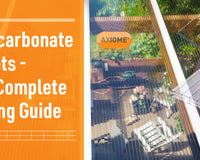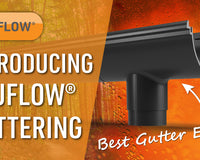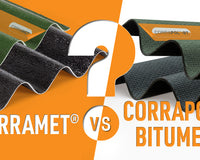Clear plastic glazing sheets are excellent for greenhouses, shed windows, secondary glazing, and many other applications where glass would get easily broken. However, clear plastic sheets are not all the same. When buying clear plastic sheeting for glazing it’s important to realise the disadvantages of acrylic and why it should be avoided.
When it comes to glazing with clear plastic, you should avoid using any type of low-cost plastic sheets, such as acrylic sheets or polystyrene sheets. There are a lot of hidden costs and risks which you will want to avoid.
Saving a small amount at the beginning of your project could cost you significant sums later with replacements. Below we have set out why you should avoid clear plastic sheets for glazing that are lower cost such as acrylic or polystyrene glazing sheets, and how making the right choice initially can provide a far longer-lasting and safer result over time.
4 Disadvantages of Acrylic Sheets:
- Acrylic sheets have a relatively low impact strength and break easily.
- When acrylic sheets are cut, they tend to crack
- If you need to drill holes in the corners of acrylic sheets, they can shatter
- Broken plastic sheets have sharp edges and spikes which could be harmful
What Glazing Sheet is Better than Acrylic?
The best clear plastic sheets for glazing are made from UV-Protected Polycarbonate. So, be sure to choose Solid Polycarbonate Sheets as they do not break like acrylic sheets do. Polycarbonate sheets are generally a bit more expensive than acrylic sheets, but you won’t have the cost of replacing cracked or broken panels so in the medium term they cost you much less.
Additionally, using polycarbonate sheets is a safer alternative. Although Acrylic is slightly stronger than glass it does easily break. When acrylic sheets break, they leave sharp jagged edges which are dangerous. Polycarbonate sheets on the other hand are much less likely to break as they are approximately 200 times the impact strength of glass and are generally classed as virtually unbreakable.
Polycarbonate sheets are incredibly robust against impact and can be cut and drilled easily without any breakage. They are also perfect for cold bending on curved structures.

Aside from the breakage issues with acrylic sheets during installation, you have to consider the risks after installation too. For example, in a greenhouse, a tool such as a spade could slip and fall against the glazing. Or, with a shed perhaps a ball from a ball game could impact the window by mistake. In both cases, you want to ensure you have polycarbonate sheet glazing, as this will generally withstand these impacts, whereas acrylic will tend to easily crack.
Another common application for clear plastic glazing sheets is for use in secondary glazing. Using a secondary glazing system to improve heat insulation in a house or protect windows from impact is common, particularly on older heritage properties. When making this investment the last thing you want is for the plastic to break or to quickly become discoloured. So once again, it’s important to choose to use a UV-protected polycarbonate glazing sheet and not a lower-cost acrylic glazing sheet.
Of course, acrylic sheets do have a purpose for applications such as indoor display areas where there is no chance of impact, and where there is no need to cut or drill the sheets on site. However, by choosing polycarbonate glazing sheets you can have total peace of mind for almost any application.
Polystyrene glazing sheets, sometimes known as styrene, are even more fragile than acrylic sheets and should be avoided completely, except for very light-duty and short-term applications in which breakage and discolouration are not an issue.
EXTRA ACRYLIC TIPS & INFO:
Is Twinwall Polycarbonate as strong as solid flat polycarbonate?
Although twinwall polycarbonate is made from very similar plastic resin and is extremely strong, because it is made from very thin layers into a structure, it can dent or crush easier than solid polycarbonate. However, twinwall polycarbonate is still much stronger from breakage than acrylic sheets and provides a lower cost than solid polycarbonate. Twinwall polycarbonate also provides a higher level of heat insulation due to the layer that makes up the structure of the sheet.
What is Perspex?
Perspex is just a brand name for acrylic sheets and has the same issues with breakage as all acrylic sheets. It is best not to use acrylic sheets for glazing applications. Instead, you can choose a quality polycarbonate sheet which is just as clear, similar to glass, and won’t break. Polycarbonate sheets are 200 times as strong as the same thickness of glass, which is why they are generally classed as unbreakable.
What is Plexiglass?
Plexiglass is just a brand name for acrylic sheets. It also breaks easily on impact or when cutting or drilling, and you should avoid using it in areas of high impact. The more popular choice is clear polycarbonate sheets which are over 10 time stronger and available in many thicknesses and sizes.
What is Axgard?
Axgard is a high-quality polycarbonate sheet with UV protection on both sides so it stays clear and doesn’t discolour. Axgard polycarbonate sheets are easy to cut to size, drill and install and is incredibly strong, so with a great impact resistance it won’t break with most general impacts, whether on installation or in application afterwards.
Axgard is also very long-lasting and weather-resistant and has an excellent light transmission. Axgard is available in sheets as thin as 2mm which are flexible and great for curve structures, and then up to 12mm thickness which provides excellent strength and rigidity.
Why do plastic sheets sometimes go yellow?
Some plastic sheets like clear polystyrene glazing sheets turn yellow after a few months in the sunlight. This is because the plastic is not UV protected and they are therefore not able to withstand the UV rays of the sun. This yellowing not only looks bad but also causes brittleness. UV Protected plastic sheets have a protective layer in them to prevent any discolouration and stop them from becoming fragile.
Need Help Cutting Your Plastic Glazing Sheets to Size?
We understand that even with the best plastic glazing sheets like Axgard and Axiome, whilst cutting the sheets to size is easy to do, some installers find it’s better if it was done already for them. That’s why we offer a free cut-to-size service.
When you are choosing your size from any Axgard or Axiome polycarbonate glazing sheet you can type in your exact sizes. Our Production Team will then manufacture the sheets to the sizes you require for each glazing sheet.
Why not save time and hassle and let us make it easier for you? If you do wish to cut the sheets to size yourself simply follow our plastic sheet cutting video guide.
Need further advice on your Glazing Projects?
Clear Amber Shop Teams are always pleased to assist. you can use our Live Chat or simply email shop@clearamber.com where our friendly Teams can provide you with guidance and support for your projects.
Remember the added advantages - Get Same Day Despatch, Free Returns & Flexible Payment!
At Clear Amber Shop you can have total peace of mind with:
- Get SWIFT Nationwide Dedicated Delivery for rapid delivery
- Return items within the scope of our NQS Returns Policy
- Spread or delay the payment by choosing our Flexible Payment Options
- Register your products for the Total Lifespan® Warranty
Our Teams are here to support you every step of the way – Talk Soon…














